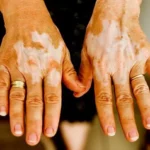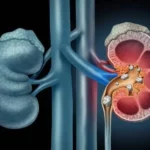What is Monkeypox?
Contents
Monkeypox is happened by a virus, which is related to the smallpox family, which is more seen in central and African countries.
Its virus has 2 main streams including west Africa and central Africa.
Monkeypox is a rare virus infection, that cannot easily spread, and doesn’t lead to severe.
It is a zoonotic virus, which means that it spread from animals to humans. It also is found in other animals, especially rodents.
Monkeypox spreads from the time symptoms start until the rash has healed, all scabs have fallen off, and a fresh layer of skin formed.
Where is it come from?
It was first discovered in 1958 when it was first found in lab monkeys which are used for research that is why its name was monkeypox.
Since the 1970s there have been small outbreaks in 10 African countries.
Its cases were first seen in the US in 2003 and this was the first time where cases were seen outside Africa (1).
In 2017 the biggest outbreak was seen with about 172 cases of monkeypox and 45% of cases were found in 21 to 40 age of men’s.
But, in May 2022, WHO declared a public health emergency concern over the global monkeypox outbreak.
Cause & how does Monkeypox Spread?
Monkeypox is caused by a virus called orthopoxvirus genus (over-shaped appearance).
It has come from the same family of viruses known to spread smallpox and cowpox (2) (3).
Smallpox was an acute spread disease caused by the variola virus, but smallpox no longer occurs naturally.
But research has shown that it could appear through natural mechanisms, laboratory accidents, or deliberate release.
Close contact with pets or wild animals – petting, hugging, licking, sharing sleeping areas, and sharing food can make you more prone to MP.
But the vital question is how does it spread from animals to humans? or humans to humans?
From animal to humans transmission can occur from direct contact with the blood, bodily fluids, or mucosal lesions of infected animals.
Being scratched or bitten by the infected animal.
Also, eating the undercooked meat of an infected animal can contribute to prone to this infection.
How can it spread from humans to humans, it can spread through include:
- Spread through close contact with an infected person
- It can spread when a person handles materials such as blankets, cloths, sheets, etc
- Its spread through cuts, on the eyes, nose, and mouth
- through sex
- pregnant women can spread this to a fetus
Check Out – Why Am I Not Getting Pregnant? 10 Unexpected Reasons
Symptoms
In most cases, after a couple of weeks, individuals can see its symptoms, so it is very vital to take possible precautions when its first symptom is seen.
Its symptoms may stay 14 to 21 days, and most are cured by themselves.
Symptoms may start to get flu-like symptoms including:
- Fever
- chills
- muscle pain
- headache
- fatigue or exhaust
- swollen lymph nodes
- runny nose
- respiratory symptoms (sore throat, nasal congestion, or cough)
- diarrhea
- rash (In rash there is pain, and frequent itching)
- aches
After 1 to 3 days of these symptoms skin eruption starts to occur and the patients get fluid-like bumps.
In these bumps, there are many changes in it, and in the end, its crust is formed, after this, scars can also form.
Then, the rash spread all through the body, it mostly occurs under the foot and palm.
Certain Pictures of Monkeypox
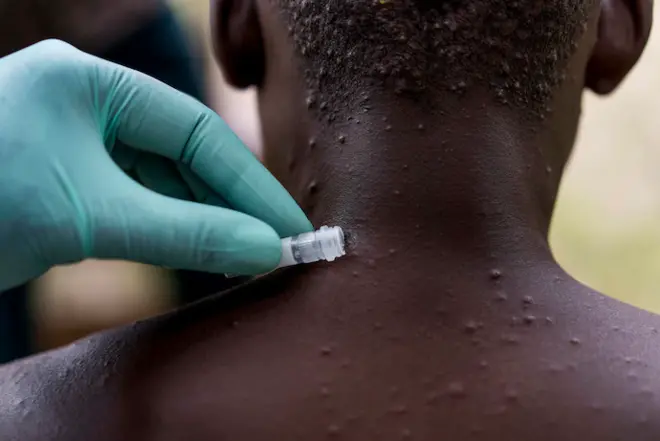
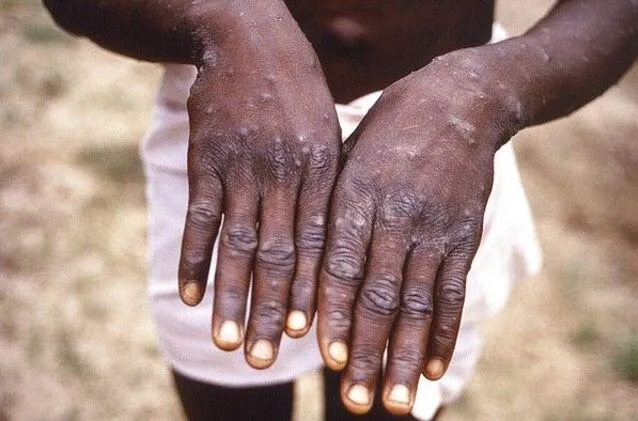
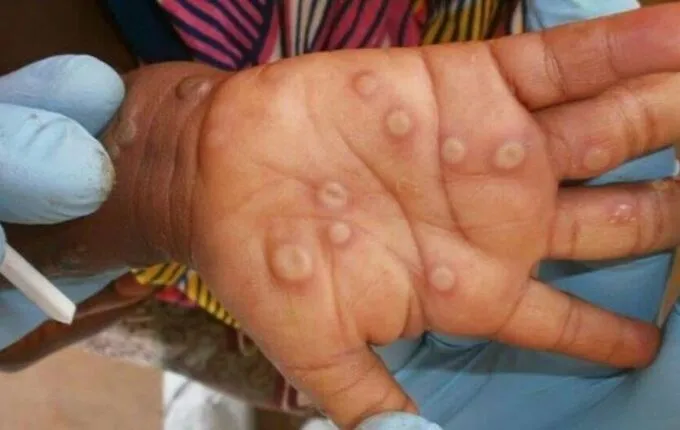
Is monkeypox fatal? and What do Researchers say about it?
It can be quite serious, especially in children who were exposed to a lot of the virus.
People who already have other health issues, or weak immune systems are more prone to monkeypox.
Death cases in very less in this, or rare but possible.
Possible serious health issues that can occur due to monkeypox include secondary issues like:
- Encephalitis (inflammation of the brain)
- pneumonia
- sepsis is a serious health condition, where the body responds to an infection that damages its own tissues.
- bacterial superinfection of skin
- vision loss
- dehydration
- permanent skin scarring
- hyperpigmentation
- even death (4)
So far, deaths have been reported, and about 10% of cases are admitted to hospitals according to the WHO.
Cases
More than 18,000 cases of monkeypox have now been reported by WHO from 78% of countries, with more than 70% of cases reported.
Early May 2022, more than 3000 monkeypox virus infections have been reported in more than 50 countries across five regions.
From the European region and 25% from the region of the Americas, so far, 5 death have been reported on 31 July 2022.
Britain’s health security agency says that in Britain and Europe many Gay and Bisexual males have been affected by this virus.
Therefore, the agency has advised them to be especially vigilant about the symptoms.
And to inform the doctor immediately if symptoms appear.
Diagnose
Healthcare providers collect your samples and safely transport them to the laboratory test.
Confirmation of monkeypox depends on the type and quality of the specimen also the type of laboratory test.
The doctor may ask you about your symptoms, such as last few days is there any contact with wild animals, and sick person?
Tests may include:
- Blood test (Polymerase chain reaction)
- your blister fluid or a skin sample test
- by seeing your symptoms
However, the doctor sees your symptoms, and might indicate some other common illness,
Is There Any Effective Treatment for it?
Currently, there is no specific proven treatment for monkeypox infection, most viral illnesses treatment is supportive symptom management in this.
However, prevention is the best option to prevent an outbreak (5).
There is no special vaccine for this, but a vaccine that protects against smallpox can protect against it up to 85%.
Apart from this, anti-viral medicine also plays a vital role in its treatment.
You may also experience the adverse effect of smallpox or monkeypox vaccine including:
- Mild fever (which is very common)
- tiredness
- feel sleep
- redness of pain in the affected area
- swollen glands
Monkeypox and pregnancy
If it occurs during pregnancy it may lead to birth defects or miscarriage.
WHO and CDC suggest that this virus can spread airborne to pregnant women, and then women to their fetuses.
Also, a pregnant woman in her 2nd trimester had a spontaneous miscarriage due to a monkeypox infection (6).
Even, studies or organizations say that no smallpox or monkeypox vaccine has been approved for use during pregnancy (7)
In addition, the disease may be milder in people vaccinated against smallpox in childhood.
If you have a positive infection or see monkeypox-like symptoms, then immediately talk to your healthcare about it.
A doctor can check your entire body including:
- Baby’s heartbeat
- screening
- ultrasound to confirm that the baby is growing well
What to Do If You Are Sick?
If you are sick, then quarantine your affected area from others, especially children, older people, and health conditions persons.
Take care of yourself if you are sick and avoid close contact. care yourself include:
- Use bandages to cover the rash to limit its spread to the environment
- do not pop or scratch blister, it slows down the recovery, and spread the virus to other parts of the body through liquid
- avoid shaving on the affected area
- keep skin clean with a wet cloth, and dry
- clean your hands often with soap, and an alcohol-based sanitizer
- wear mask
- eat healthily and plenty of water or food to allow your body to heal fast
- avoid bedding and other material that has been touched by a monkeypox-infected person or sick animal.
Check Out – Covid Vaccination: Everything You Need To Know
Precautions
To Avoid Monkeypox, You should Really Take Some precautions which include:
- Safer sex or gathering
- wear mask
- protect yourself with vaccine
- avoid infected person
Protecting yourself from wild animals, especially those that are sick or dead, including their meat, blood, and other parts must be avoided.
Make sure, food that contains meat or other parts must be thoroughly cooked before eating.
Close contact with infected persons is the most significant risk factor for monkeypox virus infection.
Health workers and household members are at a greater risk of infection.
BOTTOM LINE
Monkeypox is a zoonotic virus, that was first discovered in monkeys in 1958, and can spread from animals to humans.
Take precautions are: avoiding close contact with sick persons or wild or dead animals, avoiding pop, or scratching blisters.
People who already face other health issues, or weak immune systems, also children, and older people are more prone to MP.

